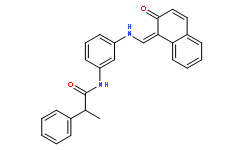
 COA COA |
 MSDS MSDS |
 HPLC HPLC |
 NMR NMR |
| CAS No: | 1105698-15-4 |
| Molecular formula(MF) | C26H22N2O2 |
| Molecular Weight(MW): | 394.47 |
| Alias | SureCN8103931; CTK8E9782; |
| In vitro | DMSO | 78 mg/mL (197.73 mM) |
|---|---|---|
| Ethanol | 7 mg/mL (17.74 mM) | |
| Water | <1 mg/mL | |
| In vivo |
| Description | Salermide is a reverse amide with a strong in vitro inhibitory effect on Sirt1 and Sirt2. Compared with Sirt1, Salermide is even more efficient at inhibiting Sirt2. | ||
|---|---|---|---|
| Targets |
|
||
| In vitro |
Salermide prompts tumour-specific cell death in a wide range of human cancer cell lines. The antitumour activity of Salermide is primarily because of a massive induction of apoptosis. Salermide induces apoptosis in cancer but not in normal cells. It induces strong apoptosis without any evident effect on the cell cycle in all the cancer cell lines analysed except in non-tumorigenic MRC5 cells. The induction of apoptosis is cell-type-specific and dose-dependent[1]. |
||
| In vivo | Salermide is well tolerated by mice at concentrations up to 100 μM. Its feeding does not produce any adverse health effects in mice as monitored by diet consumption, body-weight gain, and postural and behavioural changes[1]. |